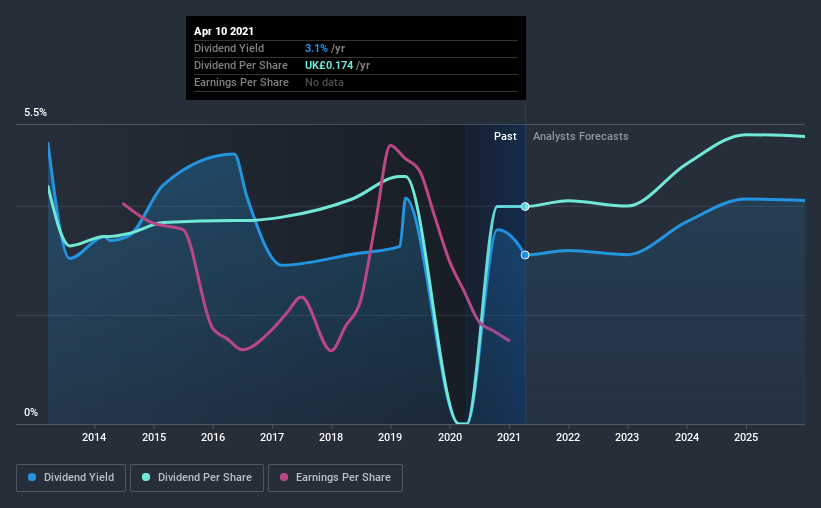Here's Why We're Wary Of Buying Vesuvius' (LON:VSVS) For Its Upcoming Dividend
Vesuvius plc (LON:VSVS) stock is about to trade ex-dividend in three days. You will need to purchase shares before the 15th of April to receive the dividend, which will be paid on the 21st of May.
Vesuvius's next dividend payment will be UK£0.14 per share. Last year, in total, the company distributed UK£0.17 to shareholders. Based on the last year's worth of payments, Vesuvius has a trailing yield of 3.1% on the current stock price of £5.615. Dividends are a major contributor to investment returns for long term holders, but only if the dividend continues to be paid. That's why we should always check whether the dividend payments appear sustainable, and if the company is growing.
View our latest analysis for Vesuvius
Dividends are typically paid out of company income, so if a company pays out more than it earned, its dividend is usually at a higher risk of being cut. Vesuvius paid out 114% of profit in the past year, which we think is typically not sustainable unless there are mitigating characteristics such as unusually strong cash flow or a large cash balance. A useful secondary check can be to evaluate whether Vesuvius generated enough free cash flow to afford its dividend. Luckily it paid out just 7.5% of its free cash flow last year.
It's disappointing to see that the dividend was not covered by profits, but cash is more important from a dividend sustainability perspective, and Vesuvius fortunately did generate enough cash to fund its dividend. If executives were to continue paying more in dividends than the company reported in profits, we'd view this as a warning sign. Extraordinarily few companies are capable of persistently paying a dividend that is greater than their profits.
Click here to see the company's payout ratio, plus analyst estimates of its future dividends.
Have Earnings And Dividends Been Growing?
Companies with falling earnings are riskier for dividend shareholders. Investors love dividends, so if earnings fall and the dividend is reduced, expect a stock to be sold off heavily at the same time. So we're not too excited that Vesuvius's earnings are down 2.7% a year over the past five years.
Another key way to measure a company's dividend prospects is by measuring its historical rate of dividend growth. Vesuvius has seen its dividend decline 1.1% per annum on average over the past eight years, which is not great to see.
Final Takeaway
From a dividend perspective, should investors buy or avoid Vesuvius? It's never great to see earnings per share declining, especially when a company is paying out 114% of its profit as dividends, which we feel is uncomfortably high. Yet cashflow was much stronger, which makes us wonder if there are some large timing issues in Vesuvius's cash flows, or perhaps the company has written down some assets aggressively, reducing its income. It's not an attractive combination from a dividend perspective, and we're inclined to pass on this one for the time being.
With that being said, if you're still considering Vesuvius as an investment, you'll find it beneficial to know what risks this stock is facing. Case in point: We've spotted 3 warning signs for Vesuvius you should be aware of.
We wouldn't recommend just buying the first dividend stock you see, though. Here's a list of interesting dividend stocks with a greater than 2% yield and an upcoming dividend.
This article by Simply Wall St is general in nature. It does not constitute a recommendation to buy or sell any stock, and does not take account of your objectives, or your financial situation. We aim to bring you long-term focused analysis driven by fundamental data. Note that our analysis may not factor in the latest price-sensitive company announcements or qualitative material. Simply Wall St has no position in any stocks mentioned.
Have feedback on this article? Concerned about the content? Get in touch with us directly. Alternatively, email editorial-team (at) simplywallst.com.


